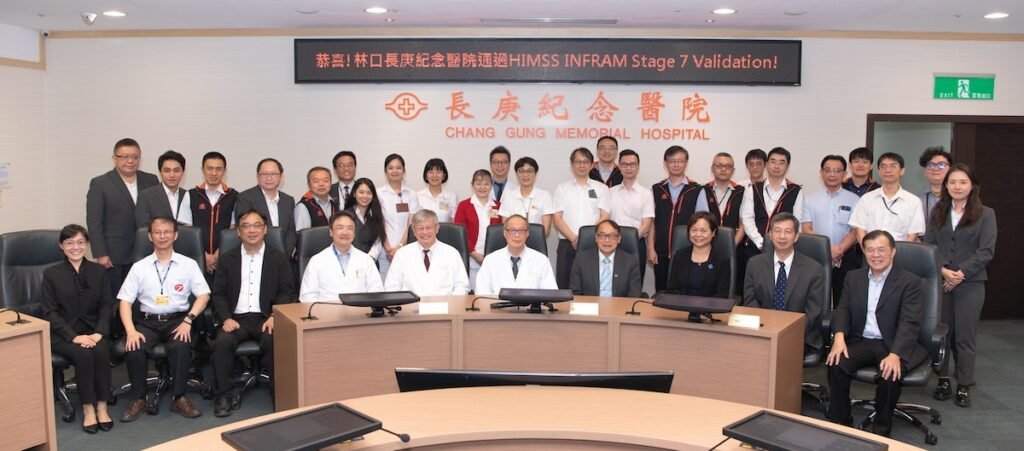Chang Gung Memorial Hospital, Linkou in Taoyuan City, Taiwan, has achieved a significant milestone by being validated for Stage 7 of the new HIMSS Infrastructure Adoption Model (INFRAM) and Stage 6 of the Digital Imaging Adoption Model (DIAM). This validation underscores the hospital’s commitment to advancing digital infrastructure and setting a new benchmark in healthcare technology.
The INFRAM model, updated in March, evaluates an organization’s infrastructure maturity based on cybersecurity, adoption, sustainability, performance, and outcomes. The DIAM assesses an organization’s capabilities in medical imaging, ensuring that digital imaging technologies are effectively supporting clinical decision-making and patient care.
Within a year, CGMH, Linkou was able to upgrade its INFRAM validation to the highest stage. This achievement was the result of a major collaborative effort across the hospital’s departments, focusing on technology upgrades, process improvements, and staff training. One of the major IT projects undertaken by the hospital was the transformation of the Medical Data Center. This project was crucial as demand increased for IT-enabled services, necessitating the adoption of AI, big data, and precision medicine.
During the INFRAM validation, HIMSS validators commended CGMH, Linkou’s advanced cybersecurity capability, rooted in a robust, multi-layered security strategy. The hospital adopted a service-focused architecture and flexible network design based on the HIMSS INFRAM framework. This involved implementing software-defined networking, upgrading to a high-speed 10-gigabyte fiber network, and adopting TIA-942 standards for data centers. The hospital also implemented its in-house secure messaging platform, Team+, to improve internal communications.
A highlight of the validation was the implementation of integrated information monitoring panels at the Security Operations Center (SOC) for real-time surveillance and rapid threat detection. The hospital’s cybersecurity approach follows a Zero-Trust model, including Managed Detection and Response and two-factor authentication.
CGMH, Linkou’s digital imaging capabilities were also recognized through the DIAM validation. The hospital collaborated closely with specialized medical teams to integrate clinical expertise with IT proficiency, ensuring that the digital imaging system effectively supported clinical decision-making and patient care.
At the core of CGMH, Linkou’s digital imaging is the AVIEW LCS Plus system provided by Coreline Soft. This AI-based software for low-dose CT chest image scanning screens for small lung nodules, helping detect lung cancer, COPD, and coronary artery calcification early. The software integrates with the hospital’s PACS and EMR systems, reducing radiologist workload by up to 87%.
Looking ahead, CGMH, Linkou plans to ramp up investments in data analytics and medical imaging management. The hospital aims to build a big data analytics platform to expand AI applications and develop AI-assisted diagnostic solutions. Additionally, the hospital plans to implement a comprehensive radiation dose tracking system, upgrade digital imaging applications, enhance data access and transmission speed, improve cybersecurity measures, and adopt FHIR standards for telemedicine interoperability.
Overall, CGMH, Linkou’s achievements in reaching Stage 7 of the INFRAM and Stage 6 of the DIAM highlight its dedication to leveraging technology to enhance patient care and drive innovation in healthcare. This milestone sets a new standard for healthcare technology in the Asia-Pacific region, positioning the hospital as a leader in digital infrastructure and medical imaging excellence. Samsung Medical Center (SMC) in South Korea and China Medical University Hospital (CMUH) in Taiwan have both maintained their validation for the previous INFRAM model. On the other hand, CGMH, Linkou in Taiwan has achieved Stage 6 validation in the DIAM, making it one of the three hospitals in the region to reach this milestone.
CGMH, Linkou has set its sights on obtaining Stage 7 validation in the DIAM and the Analytics Maturity Assessment Model after already securing the highest validations for both INFRAM and the Electronic Medical Record Adoption Model this year. This demonstrates the hospital’s commitment to digital transformation and innovation in healthcare.
Dr. Chien-Tzung Chen, superintendent and professor at CGMH, Linkou, emphasized the significance of reaching Stage 7 of the HIMSS INFRAM in enhancing operational efficiency and delivering high-quality patient care. The recognition of achieving a high level of digital maturity and infrastructure security enables the hospital to leverage AI and big data analytics to improve clinical workflows and drive further digital transformation efforts.
Dr. Ming-Shien Wen, vice chair of the smart healthcare committee at CGMH, Linkou, highlighted the importance of HIMSS certification in evaluating and refining the hospital’s use of digital imaging technologies. By aligning with international standards, the hospital aims to provide patients with accurate and timely diagnoses and treatments, ultimately improving healthcare quality and laying a strong foundation for future investments in digital healthcare.
The development of digital healthcare is seen as a crucial element in enhancing medical services, with HIMSS certification serving as a valuable tool in assessing the level of digitalization within healthcare institutions. By continuously striving for improvement and innovation, hospitals like CGMH, Linkou are paving the way for a more efficient, patient-centric healthcare environment.
Incorporating advanced technologies and international standards, hospitals in the Asia-Pacific region are driving progress in digital healthcare and setting new benchmarks for excellence in patient care. The journey towards achieving Stage 7 validation in the DIAM and the Analytics Maturity Assessment Model reflects a commitment to continuous improvement and a patient-centered approach to healthcare delivery.


